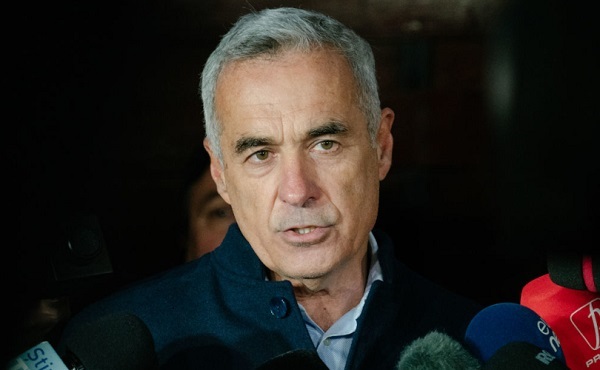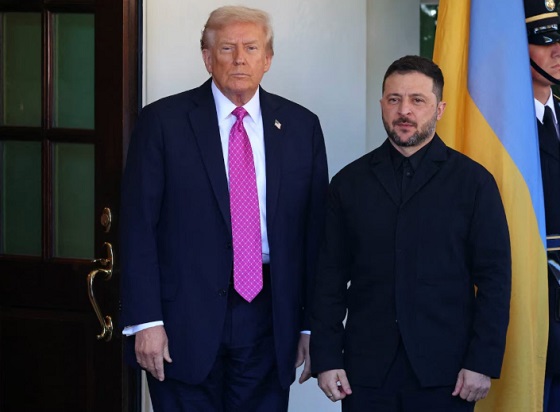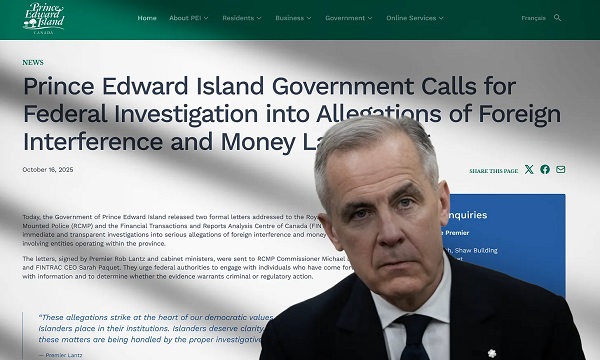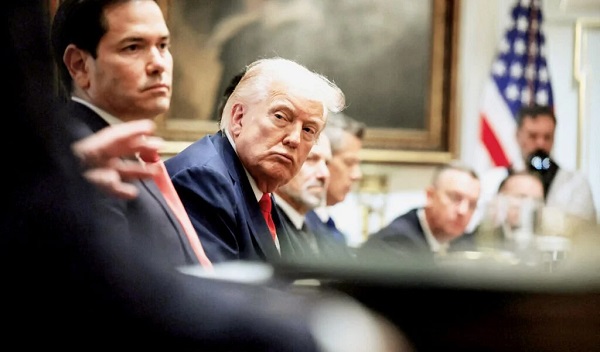International
‘Democracy is now a farce’: How the EU-NATO axis abolished freedom in Romania

From LifeSiteNews
By Frank Wright
Romanian presidential candidate Calin Georgescu was banned from running for office after defying the globalist war policies of NATO and the EU, which critics called a declaration of war on democracy to stop rising populist resistance.
Following the success of Romanian anti-war presidential candidate Calin Georgescu, the EU and NATO-backed regime in the eastern European nation has canceled his election and banned him from standing again.
In response to the cancellation of the counter-globalist Georgescu, Christine Anderson, an AfD member of the EU Parliament, gave a speech today in which she condemned the effective abolition of democracy by the European Union.
“The EU Commission states its citizens can freely choose their leaders. Why do we interfere? This is not democracy. We need to have a debate on this to get back to our principles.”
So what has happened in Romania? The Romanian writer Titus Techera has published a rundown of the prohibition of democracy under the EU-NATO umbrella:
On November 24, 2024, the Romanian people made the mistake to think that they live in a democracy guaranteed by the most moral institutions in world history, the EU and NATO, so they voted for the most recognizably Romanian kind of guy that ever captured the public attention, Calin Georgescu, in the first round of presidential elections.
Who was Georgescu? He was not a member of the corrupt globalist club, and his crime was to call for peace in Ukraine. “Unfortunately, he was not a politician, elites didn’t like him, and he committed an unforgivable sin – he represented vocally the anti-war opinions of the Romanian people.”
He won the first round of the election – and was described as a “far-right populist” and as a “pro-Russian independent.” Ahead of the second round, the election was annulled. The reason given was “Russian interference.” Politico, itself mired in the USAID scandal, published an article on January 1 saying, “How Putin won the Romanian election”:
The hit piece reported that the sitting president had released files days before the second and third rounds of voting alleging Russian interference.
The documents were incendiary, alleging the country was under a “hybrid” attack from Moscow.
Following this, reports say the Romanian intelligence chief directed judges to rule the election should be canceled. Yet journalist Thomas Fazi’s report says the “hybrid attack” came not from the Russians – but from the “EU-NATO establishment.”
As Politico also reported, the move was seen as a “stitch-up,” with liberals as well as populist anti-war figures speaking out.
“Today is the moment when the Romanian state trampled over democracy. God, the Romanian people, the truth and the law will prevail and will punish those who are guilty of destroying our democracy” – said Elena Lasconi, a liberal former broadcaster who intended to stand against Georgescu in the second round.
The reason for the action against Georgescu was also recorded by Politico: he spoke against the ideological apparatus and war machine of the liberal-global empire.
Georgescu’s fiery criticism of NATO and the EU – and his threat to end all assistance for Ukraine – stoked fears that Romania was on the brink of turning away from the West toward Moscow.
On March 11, Georgescu announced on X:
While America is becoming great again, Europe and Romania have become petty, corrupt, and under dictatorship. Our indifference, along with that of our partners, will be paid for with the broken soul of our people!
Georgescu joins Donald Trump and U.S. Vice President JD Vance in being branded agents of the Russians for seeking peace instead of war. Former Defense Secretary John Bolton, a lifelong promoter of “forever war,” has described Trump’s efforts to “stop the killing” in Ukraine as a “surrender to Putin.”
The battle lines are clearly drawn between the old globalist order and the new geopolitics of realism and a return to “normalcy.” It is sanity versus continuity, it is popular democracy versus corruption – a durable peace or permanent war. In the absence of a credible army, the EU and NATO provide one obvious security guarantee – they will protect all their subjects from popular democracy and from the dangers of free speech.
Romanian coup
The canceled election in Romania has been described as a “coup d’etat” directed by the corrupt elites of the liberal-globalist order. After filing his candidacy last Friday to run in the upcoming repeat elections, Georgescu was barred from standing by the Central Election Bureau of Romania.
Georgescu responded with a post on X, saying Europe was “now a dictatorship” and that Europe was “under tyranny.”
The move sparked further protests. Romania has seen mass demonstrations in support of Georgescu since the election was canceled in December.
The outrage and public unrest in Romania has been met with silence, said Titus Techera in The Critic:
The international media has been largely quiet, suppressing the story as though democracy didn’t matter in the West anymore.
His summary of the events leading to the exclusion of the most popular candidate from the Romanian presidential elections suggests a menacing undercurrent to the public scandal.
In March, after threats of arresting Georgescu, the authority supervising elections and the Supreme Court declared him unfit to run for the presidency. The two candidates who made the runoff have suddenly disappeared from politics, one by political violence, the other by, it seems, private persuasions, after she had declared against the coup and in favor of democracy.
Techera points out that the ground for this “coup” has been laid by a liberal “cordon sanitaire” preventing populist parties taking power. These measures in France, Germany, and Austria exclude counter-globalist parties from government – despite their commanding election gains.
EU Commissioner Ursula von der Leyen is also pursuing a “European Democracy Shield,” to partner with U.K. moves to censor news and online speech critical of the dissolving liberal-globalist order.
Techera concludes that:
Democracy is now a farce. With under two months until elections, we have reached a new scandal. Elites demand that the people vote for who they’re told to vote – but then they won’t tell us for whom they want us to vote!
One ray of hope is offered in an appeal to President Trump: “I suppose we’re all waiting to see whether Ursula von der Leyen has any opinions; or whether Trump swoops in, shines a light on the scam, and saves the day.”
Peter Hitchens, seen as the grandfather of the British right, has added his voice to that of Elon Musk, declaring for democracy and against the corrupt EU-NATO axis which now openly prohibits free elections.
This is the “threat” that JD Vance warned of in February, when he told EU and NATO leaders that the enemy of democracy was not found in Russia nor in China – but in the counter-democratic regime they represent.
As for the war, a former British naval commodore published his view last week. NATO strategy seems to be “double down and hope” in Ukraine, with Steve Jermy adding that NATO has no hope of winning any war with Russia, either.
Likewise, the liberal-globalist holdouts in Europe have no hope of turning back the tide of history which has swept their sponsored system aside. They are now “doubling down” and hoping they can hold on. Yet the threat to them is also from within. It is from their own people, who are increasingly demanding an alternative to the globalist agenda.
The liberal-globalist agenda has left the Western world in bankrupt chaos, and with the example of real change in the United States, populations in Europe are increasingly demanding renewal instead of continuing ruin. Time is running out for this cartel.
The open suspension of democracy is a desperate gambit to censor reality out of politics entirely. The reason is simple: this global system was neither liberal nor democratic. It was simply a racket, run by corrupt officials, wearing the uniforms of Church and state.
Focal Points
Trump Walks Back His Tomahawk Tease from Zelensky

By John Leake
The President meets with the Ukrainian dictator but prudently declines to give him the long range missiles he seeks.
Yesterday, after seeing reports of Zelensky meeting with Raytheon executives before his scheduled meeting with President Trump at the White House, I wrote an essay expressing my dismay at how the President has—since he entered office eight months ago—walked back his campaign promise to end the war in Ukraine. Instead, he has recently made statements suggesting a willingness to escalate the war, most notably by giving Ukraine long range missiles that can be armed with nuclear warheads.
Some of my readers objected to my suggestion that the U.S. government’s relationship with Ukraine is now so corrupt that Zelensky could get the missiles he seeks without following proper legal procedures. They should consider that the U.S. government has sent billions of money and weapons to Ukraine—long ruled by a money-laundering oligarchy —without any accounting.
Now comes the news that President Trump walked back his Tomahawk tease in his meeting with Zelensky. As he put it:
That is why we are here. Tomahawks are very dangerous… It could mean escalation – a lot of bad things could happen. Hopefully we will be able to get this war over with without thinking about Tomahawks. I think we are pretty close to that.
We thank President Trump for his prudence and we hope he will continue on the same path of prudence.
Yesterday, our NATO partner Poland allowed the alleged Ukrainian lead perpetrator of the Nord Stream pipeline bombing to walk free. Such is the fantastically corrupt world in which we are now living.
The war in Ukraine is yet another species of globalist, criminal humbug that in no way serves the interests of the American people. Consider that, while we constantly hear about the “existential threat” of climate change from carbon emissions, there has been no talk in the media—including the hysterical “climate change” German media—about the fact that the Nord Stream sabotage released between 150 million and 300 million cubic meters of gas—the equivalent to roughly 5.3 to 11 billion cubic feet.
This was the largest single industrial release of natural gas, which is largely composed of methane, widely characterized as a potent “greenhouse gas.” Bill Gates is always prattling on about the need to get rid of cattle because the ruminants release methane. I haven’t heard him say a word about Nord Stream.
If I were President Trump, I would tell Zelensky the following:
1). You and your predecessors should have never listened to the idiot U.S. foreign policy establishment of my predecessors—an establishment that has ruined every country it has touched since Vietnam. Every single blowhard Neocon foreign policy wonk in this city is a total retard.
2). I am going to use my executive power—provided by the U.S. Constitution—to end the reckless and criminal foreign policies of my predecessors, including their insane policies with respect to Russia and Ukraine since the Cold War ended in 1991.
3). The United States has always maintained elections, even in wartime, and I was elected to end U.S. involvement in your war against Russia.
4). The American people I represent have no quarrel with the Russian people, and they therefore object to American weapons being used to kill Russians. To give you long range missiles to use against Russia would significantly elevate the risk of the Russians eventually using their long range missiles to strike American targets.
5). I am bound by my oath to uphold the U.S. Constitution to serve the American people, and not the interests of warring parties 5,000 miles away, on the other side of the Atlantic Ocean.
6). I will assist you in peace negotiations with the Russians, but I will not escalate this conflict in a gambit to extract better concessions from Russia. Such an escalation will only result in more needless death and destruction, and it risks spinning out of control—a scenario deemed to be unacceptably risky during the Cold War.
7). I intend to inaugurate a new era of friendship and cooperation between the U.S. and Russia, based on the interests of our people, and not the U.S. national security state and Military Industrial Complex that President Eisenhower warned about in 1961. This Establishment has doggedly maintained a state of enmity with Russia for its own selfish interests.
8). I will offer Russia numerous incentives to give Ukraine a fair deal in peace negotiations, but effective immediately, I am terminating all military aid to Ukraine, as well as all military intelligence and targeting assistance.
9). Here’s a $7,000 cash gift from me to you as private pals. Please stop by Anderson & Sheppard tailor in London on your way back to Kiev and get fitted for a suit. You look ridiculous in that silly outfit and you’ll need a suit for our Budapest summit with Vladimir.
Please subscribe to FOCAL POINTS (Courageous Discourse).
For the full experience, upgrade your subscription.
Business
UN, Gates Foundation push for digital ID across 50 nations by 2028

From LifeSiteNews
With 30 nations enrolled, the UN and Gates Foundation’s digital ID campaign signals accelerating efforts to create a global digital infrastructure that centralizes identity and data.
The 50-in-5 campaign to accelerate digital ID, fast payment systems, and data exchanges in 50 countries by 2028 reaches a 30 country milestone.
Launched in November 2023, the 50-in-5 campaign is a joint effort of the United Nations, the Bill and Melinda Gates Foundation, and their partners to rollout out at least one component of Digital Public Infrastructure (DPI) in 50 nations within five years.
DPI is a civic technology stack consisting of three major components: digital ID, fast payment systems, and massive data sharing between public and private entities.
30 countries have now joined the UN/Gates 50-in-5 DPI campaign to rollout Digital ID, Fast Payment Systems & Massive Data Exchanges between public & private entities https://t.co/dOYCfQHObt pic.twitter.com/yP6V7zxnUD
— Tim Hinchliffe (@TimHinchliffe) October 2, 2025
50-in-5 started with 11 first-mover countries, and with the count now at 30 the participating countries include:
Bangladesh, Brazil, Cambodia, Dominican Republic, Estonia, Ethiopia, France, Guatemala, Jamaica, Kazakhstan, Lesotho, Malawi, Mexico, Moldova, Nigeria, Norway, Senegal, Sierra Leone, Singapore, Sri Lanka, South Africa, South Sudan, Somalia, Togo, Trinidad and Tobago, Uganda, Ukraine, Uruguay, Uzbekistan, and Zambia.
The 50-in-5 campaign celebrated its 30-country milestone during a sideline event at the U.N. General Assembly in New York on September 22.
There, government officials, like Ukraine’s deputy prime minister, praised the work of 50-in-5 while the ministers of digital economy from Nigeria and Togo called for an interoperable digital identity system for the entire African continent.
Nigeria’s Minister of Communications, Innovation and Digital Economy Bosun Tijani said that each country could build their own digital identity scheme, but that they should all be interoperable with one another – demonstrating both the digital ID and data sharing as good potential use cases for DPI.
“Nations want to maintain their own ID databases, but I think we have a unique opportunity to apply strong data exchange system interoperability,” said Tijani.
“I think a digital identity system that can go with you wherever you are going on the African continent would be a fantastic example,” he added.
Nigeria's minister of Communications, Innovation & Digital Economy Bosun Tijani calls for Digital ID to be interoperable across all Africa: "A digital identity system that can go with you wherever you go on the African continent will be fantastic." 50-in-5 https://t.co/dOYCfQHObt pic.twitter.com/KB380uQrmd
— Tim Hinchliffe (@TimHinchliffe) October 2, 2025
In March 2025, the Nigerian government published a framework to develop national Digital Public Infrastructure that would leverage digital ID to track and trace “key life events” of every citizen from the cradle to the grave.
“Throughout a citizen’s life, from birth to old age, there are marked moments of significant life events requiring support or service from the government,” the paper begins.
“Some of these services include registration of births, antenatal healthcare, vaccines, school enrollment, scholarships, health insurance for business registrations, filing of taxes, etc.”
These “life events” require every citizen to have a digital ID:
The Federal Government of Nigeria is on a mission to appropriately deploy digital technology to support Nigerians through these significant and profound moments so they can integrate into the state and enjoy the benefits of citizenhood from cradle to old age.

Back at the 50-in-5 milestone event, Togo’s Minister of Digital Economy and Transformation Cina Lawson called for a free, cross-border, interoperable digital ID powered by the Modular Open Source Identity Platform (MOSIP).
MOSIP is a Gates-funded platform that “helps govts & other user organizations implement a digital, foundational identity system.”
Said Lawson, “We’ve initiated conversations with our neighbors, namely Benin, to have interoperability of our ID systems, but also Burkina Faso and other countries such as Senegal, because we’re using MOSIP platform, so what we do is that we host meetings of countries that are interested the platform, so that we could see how we [are] operating it and so on.”
“Our ID system, using the MOSIP platform, is really the ID that the majority of the Togolese will have because first of all it’s free, it doesn’t require to show proof of citizenship, and so on, so that is the ID card of the poorest of the Togolese,” she added.
Togo’s Minister of Digital Economy & Transformation Cina Lawson calls for free, cross-border, interoperable Digital ID using Gates-funded MOSIP platform. UN/Gates 50-in-5 event https://t.co/dOYCfQHObt pic.twitter.com/wPC4vpms9l
— Tim Hinchliffe (@TimHinchliffe) October 2, 2025
Lawson also spoke at the 50-in-5 launch event in November 2023, where she explained that Togo’s DPI journey began with the arrival of COVID-19.
First, the government set up a digital payments system within 10 days.
“We deployed it, and we were able to pay out 25 percent of all Togolese adults, and we distributed $34 million that the most vulnerable Togolese received directly through their mobile phones,” said Lawson.
Then, came vaccine passports.
“We created a digital COVID certificate. All of a sudden, the fight against the pandemic became really about using digital tools to be more effective,” she added at the time.
Today, Togo became the first sub-Saharan African country whose digital COVID-19 vaccination certificate is recognized by the @eu_commission. Travelers with a Togolese certificate will be able to validly present it in the EU & vice versa. @AmbUETogo @KoenDoens pic.twitter.com/Uy9mRF8bkU
— Cina Lawson (@cinalawson) November 24, 2021
To get an idea where DPI is heading, Ukraine’s Deputy Prime Minister Myhailo Fedorov gave a pre-recorded speech for the 50-in-5 milestone event, saying that his country was successful in building “the state in a smartphone” via the DIIA app, which had reached 23 million users.
“For every citizen, government should be simple, convenient, nearly invisible, and accessible in just a few clicks,” said Fedorov.
“Today, 23 million people use the DIIA app […] Since the launch of DIIA in 2020, Ukrainians and the state have saved about $4.5 billion to date.”
“This is the combined anti-corruption and economic effect of digitalizing services.”
“For us, it’s powerful proof of DIIA’s efficiency and the real impact of building a digital state,” he added.
Ukraine Deputy PM Mykhailo Fedorov praises DIIA Digital ID app, with 23M users, for being a "STATE IN A SMARTPHONE" & "BUILDING AN (INVISIBLE) DIGITAL STATE." An "ANTI-CORRUPTION/ECONOMIC EFFECT OF DIGITALIZING SERVICES." Includes "ONLINE MARRIAGE" 50-in-5 https://t.co/dOYCfQHObt pic.twitter.com/MUFwbW4Yyy
— Tim Hinchliffe (@TimHinchliffe) October 3, 2025
Speaking at the World Economic Forum (WEF) Global Technology Governance Summit on April 7, 2021, Fedorov told the panelists of the “Scaling Up Digital Identity Systems” session, that it was Ukraine’s goal to “enable all life situations with this digital ID.”
“The pandemic has accelerated our progress […] People have no choice but to trust technology,” Fedorov said at the time.
“We have to make a product that is so convenient that a person will be able to disrupt their stereotypes, to break through from their fears, and start using a government-made application,” he added.
The 50-in-5 campaign is a collaboration between the Bill and Melinda Gates Foundation, the United Nations Development Program, the Digital Public Goods Alliance, the Center for Digital Public Infrastructure, and Co-Develop; with support from GovStack, the Inter-American Development Bank, and UNICEF.
The Center for Digital Public Infrastructure is backed by Co-Develop and Nilekani Philanthropies.
Nandan Nilekani is one of the architects of India’s digital identity system, Aadhaar.
Co-Develop was founded by The Rockefeller Foundation, the Bill & Melinda Gates Foundation, Nilekani Philanthropies, and the Omidyar Network.
The Omidyar Network is a funder of MOSIP.
The Digital Public Goods Alliance lists both the Gates and Rockefeller foundations in its roadmap showcasing “activities that advance digital public goods,” along with other organizations and several governments.
At last year’s Summit of the Future, 193 nations agreed to the non-binding “Pact for the Future,” which dedicates a section in its annex, the “Global Digital Compact,” to implement DPI in member states.
One year later, the U.K. announced it was going to force Britons into mandatory digital ID schemes under the guise of combatting illegal immigration.
Reprinted with permission from The Sociable.
-

 Red Deer1 day ago
Red Deer1 day agoThe City of Red Deer’s Financial Troubles: Here Are The Candidates I Am Voting For And Why.
-

 Business11 hours ago
Business11 hours agoUN, Gates Foundation push for digital ID across 50 nations by 2028
-

 COVID-1912 hours ago
COVID-1912 hours agoThe Trials of Liberty: What the Truckers Taught Canada About Power and Protest
-

 C2C Journal11 hours ago
C2C Journal11 hours agoCharlie Kirk and the Fragility of Civic Peace
-

 espionage1 day ago
espionage1 day agoPEI to Ottawa: Investigate CCP Footprints—Now
-

 Business2 days ago
Business2 days agoCutting Red Tape Could Help Solve Canada’s Doctor Crisis
-

 Energy2 days ago
Energy2 days agoPrince Rupert as the Optimal Destination Port for an Alberta Crude Oil Pipeline –
-

 Bruce Dowbiggin2 days ago
Bruce Dowbiggin2 days agoBrokeback President: We Can’t Quit You, Donald




